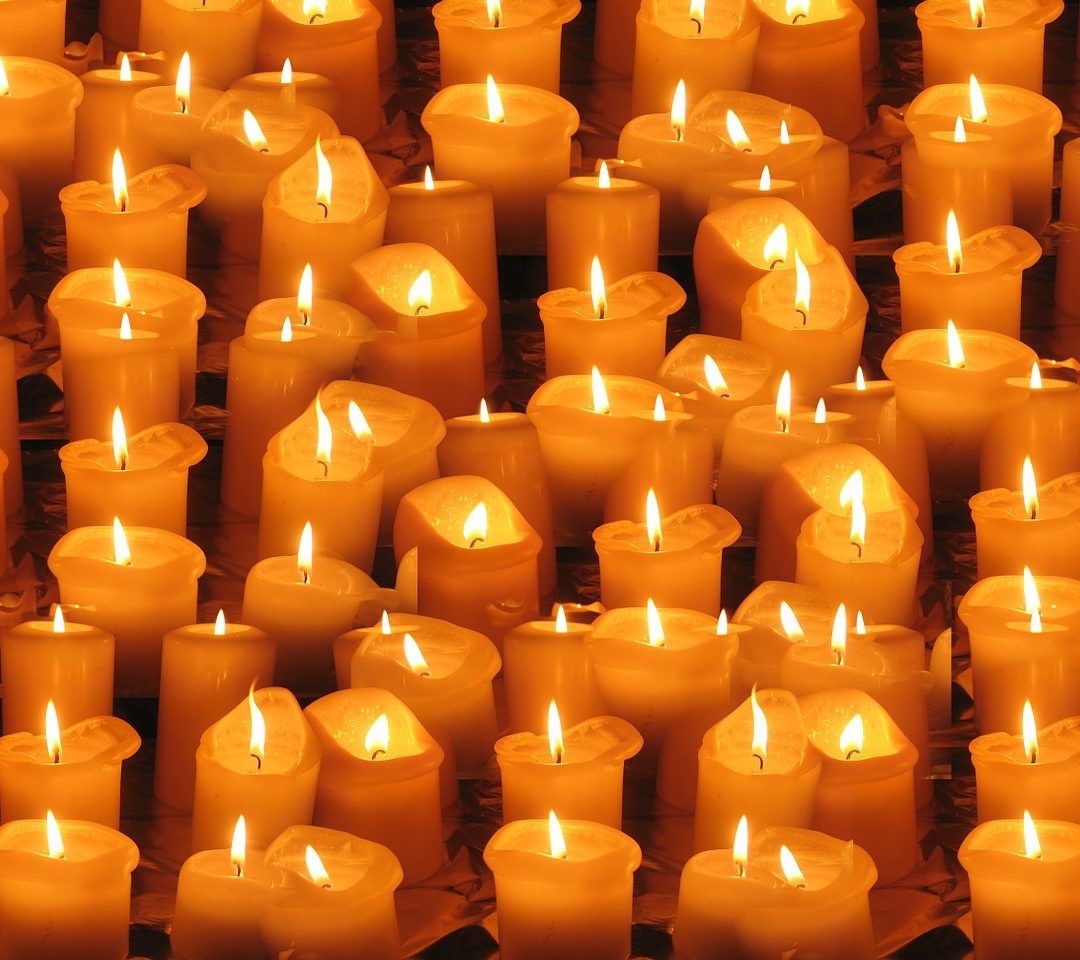
by Somya Devi | Oct 26, 2016 | Astrology, Conjunctions, Events, Holy Days
New Moon in Swati
Be careful not to become scattered this New Moon in Swati, on the dark night of Saturday, October 29th (*Times given for North America).
The Sun and Moon will coincide in this Vedic star-sign ruled by Vayu, the Lord of Wind, to kick off the next lunar cycle. The exact conjunction will be Sunday morning (at 10:38 a.m. PDT), with the darkest Moon phase on Saturday night. It will also coincide with a Venus-Saturn planetary war (exact conjunction), so we may feel a conflict between temporary pleasures and long-term goals (October 28-30). Thankfully, this dark Moon night also marks the time for celebrating Diwali (or Deepawali), the festival of light, wherein we celebrate prosperity and light prevailing over darkness! So it’s a great time to shine some light and turn our minds and hearts toward devotional practice.
Potential Depletion
There are a few factors creating the potential to feel scattered at this time, but there’s also a great opportunity to ground ourselves and steady our minds through focus and worship. In addition to Vayu’s influence, we in the Northern Hemisphere have been experiencing the cold winds increasing in the external atmosphere. As we go deeper into autumn, the vata dosha (comprised of air and ether elements) is increasing all around us. With the leaves falling and the weather changing, the process of decrease and sparsity in nature becomes evident. This results in an increase of vata energy, which can cause us to feel restless, anxious, spacey, dry, or depleted. It is extra important to do grounding and nourishing practices during this season, and to eat warm, moist, and heavier foods.***
What’s more, this lunar cycle begins with the Sun and Moon in Libra, where Sun is considered debilitated (not able to express strongly). Sun represents our vitality, energy, physical strength, and also our feeling of spiritual strength and connection with universal source. Not surprisingly, the time of year when he becomes “debilitated,” passing through Libra, is the same time we experience increased vata in the atmosphere and lessened immunity in our systems. It’s the time when we are most likely to catch a cold and begin to feel “spread thin” or “dried out.” While the Sun is in Libra, self-care is extra important. Take some time on this New Moon night to set intentions for how you will care for yourself during the coming cycle.
Another reason Sun is considered debilitated in Libra is because Libra is a sign that is very much about relationships. Sun represents our individual strength, so with Sun in Libra, we are more likely to put more of our attention on others, and on relationships, than towards our own physical health. We may be relating to our own personal power through our relationships during this time, rather than approaching it as individuals. While you are offering your love and compassion to others, don’t forget to nourish the divine within yourself as well, or you may end up feeling depleted. It is also easy to become drained when we try too hard to balance everything, another temptation of Sun in Libra.
Swati Symbolism
Thankfully, the divine universe always seems to offer just the right opportunities for solving the same challenges it presents. We just need to be willing to do the work on ourselves. This new Moon is in the part of Libra known as Swati, “the independent one,” which reminds us of our independent nature, despite the strong emphasis we may be putting on relationships at the moment. This star-sign helps remind us to look for our own inherent power, shining forth like the inner Sun.
Vayu, the wind god, is the ruler of Swati, and can bring in a restless and scattered energy to this star. He is also the father of Lord Hanuman, who is known as the greatest devotee. One lesson we learn from Hanuman is that through loving devotion, even a restless monkey mind can be tamed. He had endless devotion for Lord Rama, which gave him invincible powers to accomplish seemingly impossible tasks. Though we all have restless monkey minds at times, if we direct our attention toward love, light, or our chosen deity, we will be able to steady the mind and find immense strength within.
Practice Ideas
Some ways to still your mind through one-pointed focus include:
- Mantra recitation
- Asana practice
- Scriptural study
- Meditation on candlelight, a statue, or an image
Though a young sprout blowing in the wind (a symbol of Swati) may seem perilous, it is actually growing stronger so as to withstand the intense force of the outer circumstances. Eventually, it could grow into a tall redwood, cutting through the wind like a sword (another symbol of Swati). Swati is also related to the symbolism of a priest, which shows us the possibility for reclaiming both power and balance through devotional or spiritual practice.
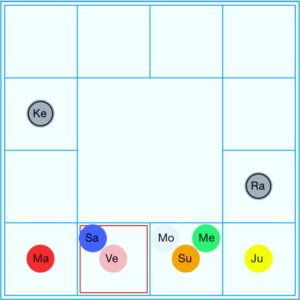 Kala Saarpa Yoga
Kala Saarpa Yoga
We may feel extra intensity seemingly out of nowhere, for the next two weeks during which the planets align in a Kala Saarpa yoga. This means that the seven major planets are all in between Rahu and Ketu, the two lunar nodes. This heavy alignment can bring up a lot of shadow work, so it is a good time to engage your toolbox for self-development. With Ketu in Shatabisha, the sign of the “hundred medicines,” alternative medicines and healing modalities can be useful towards this end.
Diwali
With all this energy in the atmosphere, enjoy the opportunity for worship offered by the advent of Diwali! This Hindu festival of light is celebrated for 6 or 7 days, with the main Diwali festival on the night of October 29th. Diwali, or Deepawali, comes from Deepa + avali, “a row of lights.”
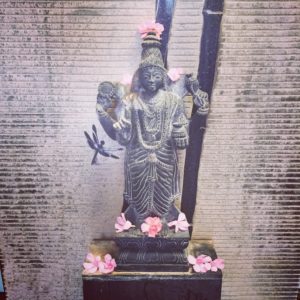 Thursday (North America) is both Dhanvantari Tryodashi (or Dhanvantari Jayanti, the birth of Lord Dhanvantari), and Dhanteras (a part of the Diwali festival). It is the thirteenth day of the waning Moon in the Vedic month of Ashwayuja. Lord Dhanvantari is known as the “father of Ayurveda” and the “physician of the Gods.” (Ayurveda is the system of natural medicine from India that is a sister science to yoga and Jyotish.) If you practice any healing tradition, especially Ayurveda, this is a good day to give thanks and call in auspicious blessings to your healing path or practice.
Thursday (North America) is both Dhanvantari Tryodashi (or Dhanvantari Jayanti, the birth of Lord Dhanvantari), and Dhanteras (a part of the Diwali festival). It is the thirteenth day of the waning Moon in the Vedic month of Ashwayuja. Lord Dhanvantari is known as the “father of Ayurveda” and the “physician of the Gods.” (Ayurveda is the system of natural medicine from India that is a sister science to yoga and Jyotish.) If you practice any healing tradition, especially Ayurveda, this is a good day to give thanks and call in auspicious blessings to your healing path or practice.
Thursday also marks Dhanteras, the first day of the Diwali festival (the Hindu festival of light). It commemorates the day that Lakshmi emerged from the milk ocean. In India, it is customary to purchase metals on this day — anything from jewelry to new statues to kitchenware (excluding iron), as a part of celebrating Lakshmi and calling in more prosperity. The metals can then be offered to your altar and will absorb and amplify the benefits of worship performed over the few days of Diwali.
It is customary to perform a puja to Lakshmi on the third night of Diwali (this Saturday in North America). Goddess Lakshmi represents wealth and prosperity (spiritual and material), as well as devotion, love, beauty, and happiness. Celebrating her on Diwali is a way to call these qualities into our lives.
It is also traditional to light candles throughout Diwali, to remind us of the divine light within. Diwali is also related to the story from the Ramayana about Lord Rama’s return from exile after fourteen years. It thus symbolizes light and goodness emerging from times of darkness. Lord Rama represents dharma, or doing our duty, as well as devotion, compassion, courage, and righteous leadership. Diwali celebrations often commemorate his and Sita’s return to the kingdom of Ayodhya after their exile.
On Saturday night as we prepare to enter the next lunar cycle, light a candle! Turn your mind toward the divine so as to focus and ground, through the practices that work best for you. Set some intentions as to how you will practice self-care during this cycle (and be sure to find me on Facebook for a live chat with tips for how to do this!).
Ram Ram, Namaste
***Be sure to Follow me on Facebook so you can tune in for my upcoming Facebook Live talks about the New Moon AND Ayurvedic tips for how to stay balanced during the high vata season!
**Limited requests for personal Vedic Astrology readings before the New Year are now available Here.
Save
Save
Save
Save

by Somya Devi | Oct 10, 2016 | Astrology, Conjunctions
We are blessed with the opportunity for deep surrender on the Pisces Full Moon, October 15th at 9:23 pm PDT.
This full Moon falls in the last degree of sidereal Pisces in the nakshatra called Revati. As our hearts and minds align with this powerful part of the zodiac, we will feel empowered to let go and trust in the divine flow. This is a potent time for ending or completing projects and ventures, as well as initiating new ones. It’s a time for cutting ties with attachments that may be holding us back from freely evolving. This full Moon has the power to help us to surrender, keeping faith on our path while letting go of the desire to control every detail along the way.
This lunar cycle began with the Sun and Moon joined in Virgo. This inspired us to spend this month organizing the details in our lives, clearing out the clutter, and harmonizing our beliefs with practical routines. It’s been a time for arranging things in our material world and intellectualizing things sensibly. The cycle began with Sun and Moon Hasta nakshatra (“the hand”), compelling us to put our hands to work in skillfully weaving the tapestries of our lives.
With the Moon now in Pisces, opposite Virgo, we reflect on the parts of our lives that cannot be maneuvered through our physical efforts, nor organized in our intellectual minds. Some things will never fit into earthly boxes or material understanding. Pisces’ energy ushers us to go beyond the earthly plane and dive into the ethereal waters to ride the waves of spirit. Though we do not cease our Virgoan effort towards becoming more organized, the reflective juncture of the Pisces full Moon teaches us to surrender the fruits of our effort and leave the final outcome in the divine hands.
The Revati Full Moon offers a good opportunity for completing projects and moving forward into new ones. If there is anything you have been working on that you can’t quite seem to put the finishing touches on, now is a good time to consider wrapping it up. As the Moon is on the threshold of the doorway into Aries, it is also a good time to get ready to begin a new venture. Finishing one journey or project creates space for the next. Jupiter and Mercury are also opposite this full Moon (joining the Sun in Virgo), shining the grace of both Pisces’ and Revati’s rulers onto us, in addition to the Sun’s full-power illumination.
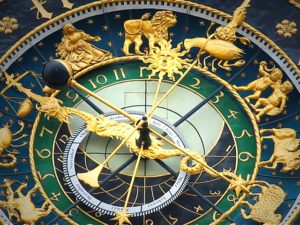 The Full Moon falls at 29°09′ of Pisces, a place of endings in the “last” degree of the zodiac before it ticks back into zero degrees of Aries, a place of beginnings. Revati translates as “the wealthy,” indicating material abundance as well as the spiritual wealth gained through lifetimes of evolution before we reach the final stage of liberation. The deity for Revati is Pushan, the nurturer, and a shepherd of flocks who protects us on long journeys. As we complete one chapter and embark on a new one, we are blessed by Pushan, along with Jupiter and Vishnu (associated with Mercury). They offer protection and grace on the road ahead. The drum, a symbol for this nakshatra, provides a steady beat to help to keep us on the path and remember that there is a rhythm in the divine flow.
The Full Moon falls at 29°09′ of Pisces, a place of endings in the “last” degree of the zodiac before it ticks back into zero degrees of Aries, a place of beginnings. Revati translates as “the wealthy,” indicating material abundance as well as the spiritual wealth gained through lifetimes of evolution before we reach the final stage of liberation. The deity for Revati is Pushan, the nurturer, and a shepherd of flocks who protects us on long journeys. As we complete one chapter and embark on a new one, we are blessed by Pushan, along with Jupiter and Vishnu (associated with Mercury). They offer protection and grace on the road ahead. The drum, a symbol for this nakshatra, provides a steady beat to help to keep us on the path and remember that there is a rhythm in the divine flow.
We may feel especially dreamy, imaginative, and optimistic around this full Moon, as is the nature of Revati. Pushan helps to light our path with streetlights and other signaling lamps, so you may find some light shed in areas that have felt dark. The Full Moon in general brightens our emotional awareness, as the Sun illuminates the mind and heart by shining fully onto the Moon. Mars also casts his aspect onto this Full Moon, from Sagittarius, which adds courage as we deep dive into surrender. His placement also encourages us to take inspired actions in alignment with our beliefs.
We are definitely working hard for our desires right now, with Saturn and Venus joined in Scorpio. This placement, which will last about a month, puts some pressure on our relationships and on how we go about fulfilling our sensual desires. We are really thinking about the long-term around these areas right now, due to Saturn’s influence on Venus. This makes us consider what kind of work it will take to support our relationships and happiness for the long run. Saturn can help us to make a commitment and also teach our Venusian side to find a compromise that won’t cause us to burn out.
With these two together in Scorpio, we have the opportunity to transform our commitments and relationships and take them to a deeper level that supports our soul’s evolution. This alignment can help us to transform ourselves, if we face our fears, and give us a new perspective on where happiness really lies.
On October 16th, the Sun will go into Libra, where he is considered debilitated. With this placement we can tend to exhaust ourselves by attempting too many balancing acts. Sun and Saturn will both be putting the pressure on relationships now. Though we have the desire to purify them and make them stronger, it is also really important to remember to step back and take care of ourselves as well. Self-care is very important during Sun in Libra (for the next month), as our immunity can be lowered and we are more susceptible to physical and emotional depletion. Be sure to have warm and nourishing food and drink, keep your head and neck protected from the cold and wind, and take some time for grounding meditation.
This Saturday night, take a step back from your efforts to organize everything and reflect on deep surrender on the Pisces Full Moon.
*Did you like Deep Surrender on the Pisces Full Moon? Please Like, Comment, and Share, and join my free newsletter to stay up-to-date!
Save
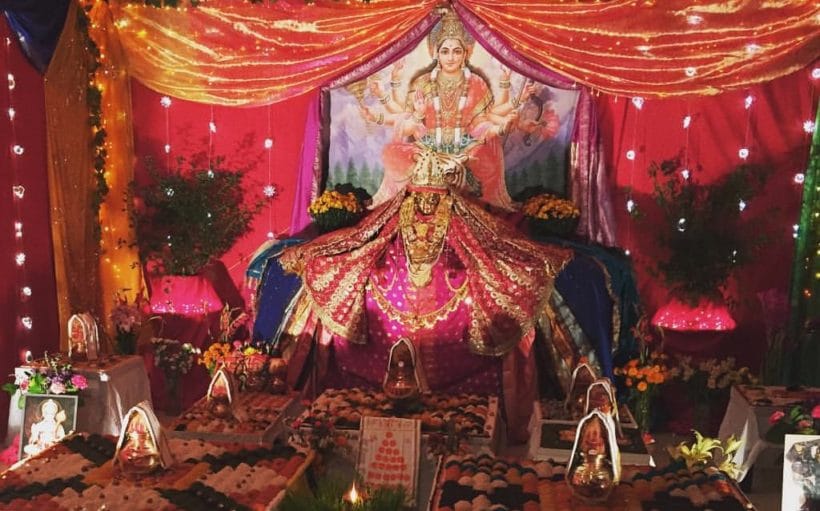
by Somya Devi | Sep 26, 2016 | Astrology, Events, Holy Days
Maha Navaratri 2016 will be from October 1st-10th, the first ten days of this new lunar cycle. In this important Hindu holiday, we celebrate the Goddess through “the great nine nights.” Goddess, Devi, Shakti, Durga, Divine Mother, the many names and forms all represent the dynamic and fluid feminine power that enlivens all of existence.
She is the creatrix, the warrioress, the nurturer, the purifyer, the protector. While she’s in the innocent and fertile maiden so is she the wise and learned crone. Both the nurturing mother, and the one who gives “tough love.” The impassioned lover, the devoted bhakta, the disciplined yogini. We see Goddess appear through us in innumerable manifestations. Through her many forms she teaches us and offers us countless blessings–love, compassion, courage, learning, discipline, surrender, success, enlightenment, and bliss. This festival is a time for celebrating the supreme feminine power in all her glory, and the many blessings she bestows upon us.
As with most Hindu celebrations, this festival correlates with the lunar calendar, and thus begins on the first day of the waxing Moon after the New Moon of September 30th. The celebration is through the “nine nights” of October 1-9, 2016, and into the tenth morning known as Vijayadashami, “the day of victory,” on October 10th. Worship during Navaratri is most generally dedicated to Goddess in the form of Durga, the demon-slayer, but there is much nuance and variation to practice and forms of celebration throughout India. Above all, Navaratri is a community celebration of the Divine Mother, and the love, abundance and protection she gives.
There are many Navaratri celebrations throughout the year, but the fall-time Navaratri is the most widely celebrated, and is thus called Maha Navaratri – “the great nine nights”. It correlates with the time of the harvest, a time to give thanks for the abundance of the year’s work. Grains and crops are often offered to Devi as part of the celebrations. Ritualistic worship (puja) typically occurs in homes and temples throughout the nine nights and into the tenth morning of celebration.
The Many Forms of Goddess
Durga-Lakshmi-Sarasvati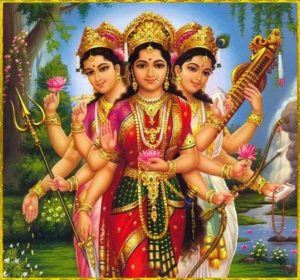
In Kerala and other places in India, the first three nights of worship are dedicated to Durga (the invincible), the next three to Lakshmi (Goddess of prosperity), and the final three to Sarasvati (Goddess of learning). Durga helps us to destroy and remove the negative tendencies in our minds and hearts, freeing us from the obstructions to our spiritual and material pursuits. Lakshmi helps us to cultivate positive qualities like compassion and devotion, and leads us towards both spiritual and material prosperity. Sarasvati assists us in attaining knowledge and wisdom, through the illumination of our consciousness. She aids in awakening sattva, the quality of purity, and the flow of prana, the vital breath. After removing inner and outer obstacles and cultivating prosperity through virtuous qualities, our devotion, service, and practice help us to attain a state of peace, bliss, and oneness.
Sarasvati-Lakshmi-Kali/Durga
In the Kali Kula (Kali school of worship) in northeastern India, Sarasvati is worshiped on the first three nights, followed by Lakshmi and then Kali/Durga on the last three. Sarasvati, Lakshmi, and Kali/Durga (Kali emerged from Durga) are also known as the consorts of Brahma, Vishnu, and Shiva. The Goddesses, therefore, provide the shakti to the cosmic processes of creation, preservation, and death/transformation, similar to their male counterparts. Consequently, worship in this manner is dedicated to the cycles of life and Mother nature, through birth, then sustenance, then death. Death is not a complete stop, but allows for the regeneration of energy into a new cycle once again.
9 Forms of Goddess
Throughout India, the nine nights of Navaratri are often dedicated to 9 different incarnations of Durga, allowing the worship of many different aspects of Shakti in a gradual evolution. You can read the stories and significance of these 9 goddesses here, or a more a brief introduction, here:
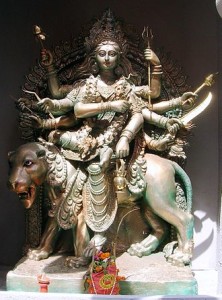 1. Shailputri
1. Shailputri
“Daughter of the mountain”; creative energy, muladhara (root chakra), awakening; Awaken your connection with Goddess today or initiate a new venture, calling on Shailputri for new beginnings.
2. Brahmacharini
The ascetic; tapas, discipline, devotion, strength, wisdom, creative abundance; Good day for fasting and meditation, connection with svadhistana (sacral chakra).
3. Chandraghanta
Warrioress; protection, courage, grace, manipura (solar plexus); Destroy your internal obstacles by offering them to Chandraghanta.
4. Kushmanda
Creatrix of the “cosmic egg”; strength, health, happiness, success, relationships; Connect with the vital Sun energy and the anahata (heart chakra) today.
5. Skandamata
“Mother of Skanda/Kartikeya”; motherly love, nourishment, protection, purity; Call on divine truth through the vishuddha (throat chakra), invoking Skandamata to lead you towards victory.
6. Katyayani
Warrioress who destroyed Mahishasura (the buffalo demon); victory, devotion, strength, removing obstacles; Meditate on these qualities of Goddess through the ajna chakra (third-eye) today.
7. Kalaratri
“Dark/black night,” representing a fierce form of Durga/Kali; darkness, death, surrender, dissolution of pain; Connecting with the sahasrara (crown chakra), remember that Divine Mother offers love, compassion, and many blessings even in hard times. Even in the midst of apparent darkness, and helps us to go beyond the boundaries of the material body-mind and connect with spirit.
8. Mahagauri
“Great white goddess”; detachment, purification, renewal, protection, virtue; Through detachment and devotion, we emerge purified, shining and radiant after surrendering in the dark night. Rejuvenative herbs and foods are good today.
9. Siddhidatri
Goddess of “siddhis”; magical, spiritual or mystic powers and blessings, fulfillment of desires, devotion, divine union; Invite Goddess to reveal her presence to you everywhere and in every moment.
Personal Practice Ideas for Navaratri
If possible, it is great to reduce our workload and gather with community at local temples or places of worship. We can also create a little time and space at home and conduct some personal practices to celebrate Goddess energy. Here are some ideas to do at home or with a group throughout the nine nights of Navaratri:
Altar
Create a sacred space, a Durga altar, or a Goddess altar. Even if you already have one, you can refresh it in some way or rearrange it specifically for Navaratri. Include images or statues of the Goddess(es) you have a relationship with. This could be according to one of the groups of forms above.
Invocation
Even if you don’t have much time, dedicate at least a few minutes each day to connecting with the Divine Mother in front of your altar.
Journal
Write in your journal about what qualities of Goddess you perceive and connect with. What aspects would you like to strengthen or to cultivate more deeply? Write any and all prayers and offer them to the form of Goddess that appeals to you.
Light
Offer light to illuminate Goddess’s power, helping her to shine more brightly into the world and your life. You can light a candle by the altar and keep it burning when you’re at home. You can even keep an electronic tealight on symbolically when you are away.
Flowers/Grains
Offer flowers or grains (even a small dish of dried rice) to celebrate Devi in the form of mother nature, fertility, the abundance of the harvest, and the cycle of life.
Offerings
Offer incense, bells, water, or food if you feel called, by placing it on the altar, or mentally offering it to Goddess throughout the day. You can also offer something symbolic of your own work or practice, whatever you have been cultivating for harvest through the year. In offering this you surrender the fruits of your efforts to the Divine Mother.
Fasting
Some people choose to fast in some variation, if this is something you have practiced before. This might include fasting during the day, fasting with only milk or fruit, or abstaining from alcohol and non-vegetarian foods during Navaratri.
Chanting
Chanting the Devi Mahatmyam, a verse to the Goddess, is a common practice during the nine-night festival. You can also chant another Goddess mantra or songs that are special to you and your relationship with Devi.
JAI MA DURGA!
Personal Vedic Astrology chart readings and forecasts are available Here.
Did you like Maha Navaratri 2016? Please Like, Comment and Share!
Save
Save
Save
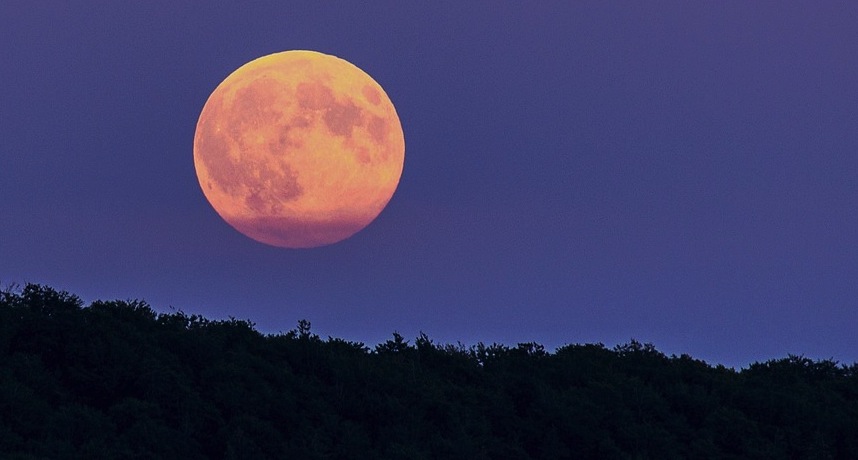
by Somya Devi | Sep 12, 2016 | Astrology, Conjunctions, Eclipses, Planets Changing Signs, Retrograde
It feels like just yesterday that I was writing last year’s article on the Harvest Moon, reflecting on the contracting sensation beginning to feel tangible in nature, as we slowly move from summer into fall and towards winter. For the last week or so, I’ve been pleasantly aware of the slight briskness in the air and the energetic shifts taking place as we move from the multi-directional activity of summer to the more focused and quiet happenings of autumn and winter. (As a natural introvert, I am actually loving the change and excited to feel the atmosphere settling down around me!) I’m definitely feeling ready for the Harvest Moon and lunar eclipse of September 16th.
Harvest Moon
The Harvest Moon is the Full Moon that occurs closest to the autumn equinox (September 22nd), and brings with it a few nights of very bright moonlight under which farmers are able to harvest their crops. (The Moon normally rises about one hour later each night, but for this week he will rise only half-an-hour later per day, giving much brighter evenings.) This is also a time where we energetically begin to harvest that which has come from our efforts put forth throughout the year, as we move into a more inward period for the darker months (in the northern hemisphere). It is also a potent moment to offer our prayers and to harvest the bounty of growth that comes with our own self-effort in shadow work.
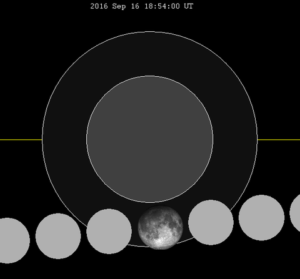 What is particularly unique is that this Harvest Moon, like last year’s, is also accompanied by a lunar eclipse. The Moon reaches its peak fullness at 12:05pm PDT on Friday, September 16th, and the penumbral lunar eclipse will also occur around this time (at 18:54 UT), but will only be visible from the other side of the world. This eclipse won’t be as spectacular as last year’s Blood Moon, but folks in that area of the world will get to see a slight shadow as the Moon passes through the outer edge of the earth’s shadow.
What is particularly unique is that this Harvest Moon, like last year’s, is also accompanied by a lunar eclipse. The Moon reaches its peak fullness at 12:05pm PDT on Friday, September 16th, and the penumbral lunar eclipse will also occur around this time (at 18:54 UT), but will only be visible from the other side of the world. This eclipse won’t be as spectacular as last year’s Blood Moon, but folks in that area of the world will get to see a slight shadow as the Moon passes through the outer edge of the earth’s shadow.
Lunar Eclipse in Pisces in Purva Bhadrapada
The Sun and the Moon will be at just 0°14′ of Virgo and Pisces, respectively. With the nodes still in Leo and Aquarius, and the Moon not fully established in either Aquarius or Pisces, this is a great time to examine the energy of the Full Moon’s nakshatra, Purva Bhadrapada, as an indicator of this eclipse’s energy. Purva Bhadrapada is a nakshatra (star-group) that bridges the two major constellations, from 20°00′ of Aquarius to 3°20′ of Pisces. This star-sign brings a strong energy of purification, which will help us to harness the already transformative power of the eclipse.
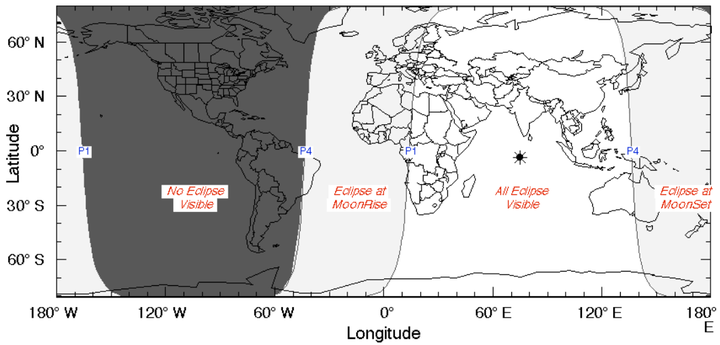 As we move with the Moon from the end of Aquarius to the beginning of Pisces in Purva Bhadrapada, we are in the place where we must let go of worldly activity, service, and socializing and into a place of solitude (meditation, sleep, and, ultimately, death and liberation). Pisces is the last stop on the train of this life, and this nakshatra represents the point in time where we must begin to face the fact that there is a last stop. It is a place where we can begin to embrace detachment, from all our worldly gains, relations, and activities, and connect with the subtler realms of being and spirit.
As we move with the Moon from the end of Aquarius to the beginning of Pisces in Purva Bhadrapada, we are in the place where we must let go of worldly activity, service, and socializing and into a place of solitude (meditation, sleep, and, ultimately, death and liberation). Pisces is the last stop on the train of this life, and this nakshatra represents the point in time where we must begin to face the fact that there is a last stop. It is a place where we can begin to embrace detachment, from all our worldly gains, relations, and activities, and connect with the subtler realms of being and spirit.
Accompanied by the energy of Ketu, this Full Moon Lunar Eclipse offers us a powerful chance to cut cords and free ourselves from unnecessary attachments… especially attachments to our own desires and illusions of control. This lunar cycle began with a Solar Eclipse in Leo. With the lustful Rahu in Leo since January, we have been ravenously driven to find and harness a sense of power and control in this uncontrollable world (especially in the area of life shown by Leo in your chart). The Solar Eclipse on September 1st revealed our shadows around this effort, and the illusory nature of power and control. This Full Moon helps us to reflect on and balance that energy, and offers the capacities for transformation and purification towards this process.
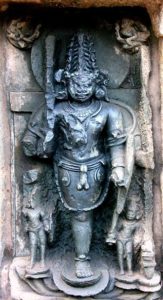 Since the Moon is technically just over the boundary into Pisces, this is an 8th-house Full Moon (8th house from where the New Moon occurred), which always adds a reshaping and mystical quality to the energy at hand. Purva Bhadrapada itself brings on energies for purification and transformation, as it leads us from the material world into the ethereal. Furthermore, the deity for this nakshatra is Aja Ekapada, “the one-footed goat,” who is related to Rudra, a destructive form of Shiva. The destructive nature of Shiva is that which allows us to destroy one thing in order for that energy to transform, rise again, and grow into its new phase of evolution. He also offers us the power to destroy illusion and attachment, which is a good tool to have at hand at the time of an eclipse.
Since the Moon is technically just over the boundary into Pisces, this is an 8th-house Full Moon (8th house from where the New Moon occurred), which always adds a reshaping and mystical quality to the energy at hand. Purva Bhadrapada itself brings on energies for purification and transformation, as it leads us from the material world into the ethereal. Furthermore, the deity for this nakshatra is Aja Ekapada, “the one-footed goat,” who is related to Rudra, a destructive form of Shiva. The destructive nature of Shiva is that which allows us to destroy one thing in order for that energy to transform, rise again, and grow into its new phase of evolution. He also offers us the power to destroy illusion and attachment, which is a good tool to have at hand at the time of an eclipse.
We have been doing a lot of inner work this year around the themes of Leo and Aquarius, finding and embracing personal power and self-love, and balancing that with universal service and love for all beings. This eclipse gives us a chance to step back and feel a little more detachment on both sides of that axis, diving back into the deep well of Pisces where all energy flows together back into source. This may be a much-needed perspective given the zealous fervor brought on by the Jupiter-Rahu conjunction this year (January through August), and the heated pressure brought on by the Saturn-Mars conjunction (March through next week).
If you need a break from all of the astrological intensity being handed out this year, I think this is your chance. Shadows do arise during the eclipses, but the more dedicated we are to looking at them and being willing to make and allow change in ourselves, the better off we are after they pass. As the the Full Moon heads into Pisces on this lunar eclipse, allow yourself to surrender to the flow and trust in source. This is the lesson being offered that will help free you from any feelings of chaos or confusion. Your higher power and meditation are of great support now (as always!). You can also connect with the water, study your dreams, and offer your power to your perceived divinity.
More to Come this Month
Venus moves out of debilitation (in Virgo) and into Libra on September 18th, bringing more energy for compromise rather than nit-picking in the realm of relationships. Mars parts ways with Saturn a few days later, as he moves into Sagittarius on the 21st. This should take some of the heat out of the pressure-cooker we’ve been feeling in Scorpio, as we reconsider our long-term goals in that area of our life. On the 22nd Mercury goes direct, but will still be joined with Rahu for two more weeks, so remain mindful of potential stress or confusion in communication lines.
The next New Moon on September 30th will lead us into the Navaratri Festival, a ten-day period for celebrating the Goddess and all her Shakti. Also coming in with the New Moon is a Kala Sarpa yoga (alignment), as all planets cross to one side of the Rahu-Ketu axis. This will affect us for two weeks of each month until January (for the other two weeks, Moon will be on the other side of the axis). This can add a level of heaviness to our general experience, but also ability to see into the psychic depths, as we continue our inner exploration around the Leo-Aquarius nodal axis until the final eclipses of this transit in February.
If you’re still not sure how this Rahu-Ketu transit is affecting you, be sure to get your free gift, the Free e-Book on Rahu, Ketu, and the Eclipses, which includes a forecast for your personal sign. There are also still a few spots available for eclipse readings prior to this eclipse, and in the weeks after, in order to help you integrate the lessons of this period.
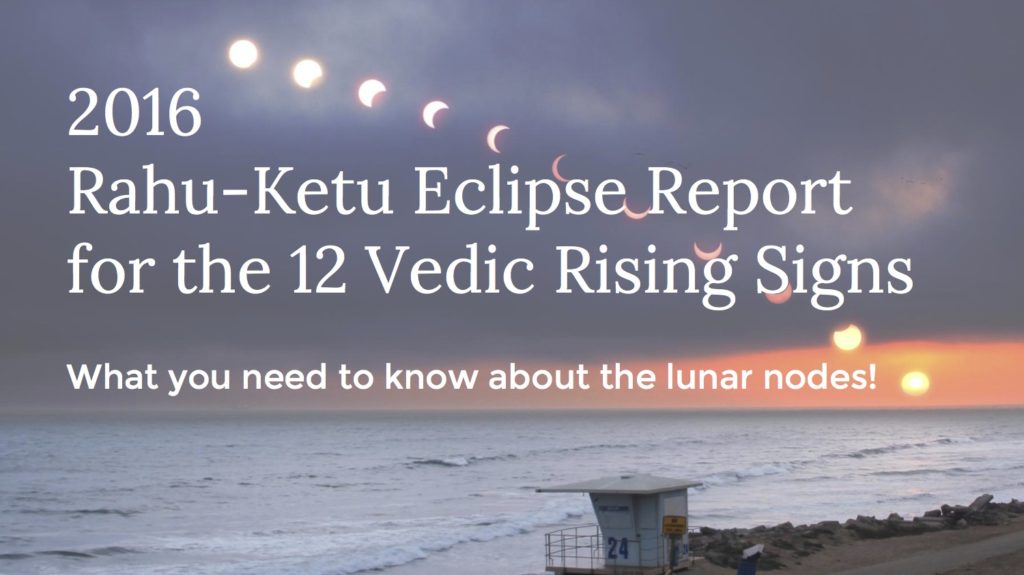
Did you like Harvest Moon and Lunar Eclipse of September 16th? Please Like, Comment, and Share!
Save
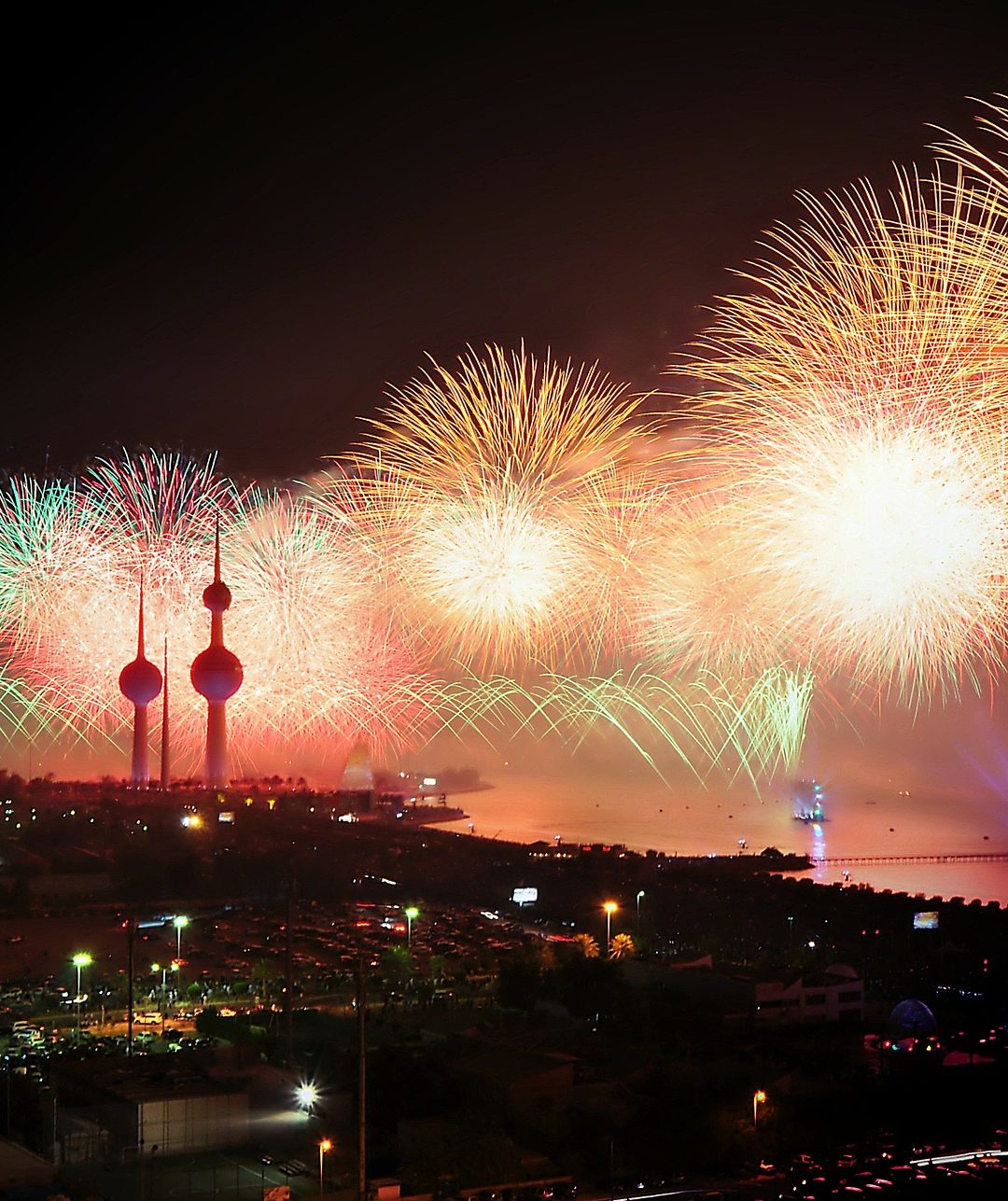
by Somya Devi | Jul 14, 2016 | Astrology, Conjunctions, Retrograde
Next Tuesday brings Guru Purnima on the Full Moon in Capricorn. The peak of the full Moon will occur on July 19, 2016 at 3:57 pm PDT. Purnima is the full Moon phase of the month, and guru means remover of darkness, but is commonly translated as teacher. Guru Purnima is an auspicious time for celebrating our teachers. Under the light of the full Moon, we give thanks for the illumination and wisdom that they have brought into our lives. Guru is also the planetary name for Jupiter (in Sanskrit and Vedic astrology), who represents the principles of expansion and inspiration in our lives.
This full Moon falls at 3 degrees of sidereal Capricorn, highlighting our quest for structure to support to our feminine, yin essence. Capricorn is a feminine earth sign and is ruled by Saturn, the planet that drives our focus towards the bigger picture. Saturn makes us remember the eternal nature of our soul, and through Capricorn, he inspires practical action in the earth realm to help us to protect and support our soul’s evolution. This full Moon will help us to remember to rise to meet our responsibilities and persevere through any difficulties we are facing.
This Capricorn energy offers a great time to tap into your spiritual practices. It’s time to bring them into the earthly realm, rather than just thinking about them. Capricorn is practical, and that means it’s time to practice. Sit down on the ground and connect with your crystals, cards, malas, or instruments. Practice also includes doing your duty as well as selfless service. Service that upholds the teachings of your gurus can be a special offering you make on this day.
In the Vedic calendar this full Moon and Guru Purnima fall on the nakshatra of Uttara Ashadha. This star-sign is ruled by the Vishvadevas, the 10 lords of dharma. Dharma refers to our duty in life, both earthly and spiritual. These will both be illuminated for us on this full Moon. Uttara Ashadha constellation bridges Sagittarius and Capricorn, signs ruled by Jupiter and Saturn. Its energy supports holding high ideals, and the commitment needed to support them. In remembering our teachers we will also remember our highest values and our purpose. It is said that in addition to each individual’s unique purpose in this life, we all share the higher purpose of attaining self-realization.
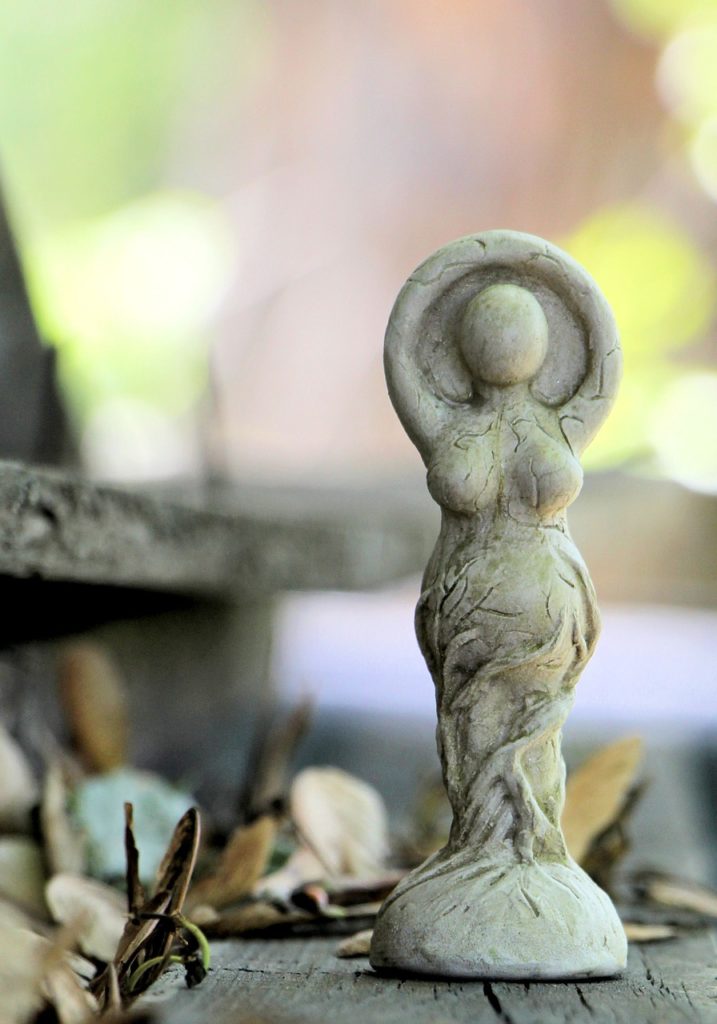 At the time of the full Moon, the Sun will be opposite Capricorn, in sidereal Cancer. We are at the point in the cycle where we need to harmonize the energy of these two signs, balancing our watery emotional nature with our practical earthy side. With the Sun in Cancer, we find our strength through the heart and our intuition. The Moon in Capricorn balances this by bringing our focus towards the earth realm and the bigger picture, while our emotional sensitivity and intuition is heightened.
At the time of the full Moon, the Sun will be opposite Capricorn, in sidereal Cancer. We are at the point in the cycle where we need to harmonize the energy of these two signs, balancing our watery emotional nature with our practical earthy side. With the Sun in Cancer, we find our strength through the heart and our intuition. The Moon in Capricorn balances this by bringing our focus towards the earth realm and the bigger picture, while our emotional sensitivity and intuition is heightened.
The bigger picture and our long-term goals and commitments are definitely on our minds right now because of Saturn’s influence. This Full Moon is receiving an aspect from retrograde Saturn in sidereal Scorpio. Since March, Saturn has appeared to move backwards in retrograde motion, causing us to backtrack and reconsider our long-term commitments in a few specific areas of life. (The areas of life indicated by Scorpio, Capricorn and Aquarius in your Vedic chart have been under scrutinization, or may have just felt stuck.)
There is one month left during Saturn retrograde. This is our time to really go inward, finding our truth, facing our fears, and determining the long-term direction we want to pursue. We feel a lot of pressure here now because Mars is once again joining Saturn in Scorpio, and will be for the next two months. The two will come head-to-head in late August (within one degree of each other), and we will need to really stay centered to maintain balance amidst this energy.
Jupiter is also getting ready to move signs in about one month, transiting fully from sidereal Leo to Virgo. For the last year he has been in sidereal Leo, and personal beliefs and self-empowerment have been getting a lot of attention. Since January, the shadow planet Rahu has also been joining him there, inciting some very radical ideas and power-struggles. When Jupiter transits into Virgo in mid-August, we will feel a shift towards more grounded philosophies, at large, and more trends towards practical thinking. This transit will also have profound effects for each individual based on where Virgo lies in your chart. You will feel a boost of energy for the next year in this area of life. (Be sure to sign up for free updates at my site to receive your personal Jupiter in Virgo forecast, coming soon to your inbox).
 As my guru says, “May we all become lamps spreading light to the world, and may grace help us to achieve this.” This Guru Purnima on the full Moon in Capricorn, connect with your teachers and that which inspires you most.
As my guru says, “May we all become lamps spreading light to the world, and may grace help us to achieve this.” This Guru Purnima on the full Moon in Capricorn, connect with your teachers and that which inspires you most.
With the upcoming shifts of Saturn, Mars, and Jupiter, now is a great time to book a personal reading to see what will be changing for you. Be sure to sign up here to receive your free personal forecasts and Vedic Astrology news.
Did you like Guru Purnima on the Full Moon in Capricorn? Please share, comment & like!
Did you Save
Save

 Kala Saarpa Yoga
Kala Saarpa Yoga Thursday (North America) is both Dhanvantari Tryodashi (or Dhanvantari Jayanti, the birth of Lord Dhanvantari), and Dhanteras (a part of the Diwali festival). It is the thirteenth day of the waning Moon in the Vedic month of Ashwayuja. Lord Dhanvantari is known as the “father of Ayurveda” and the “physician of the Gods.” (Ayurveda is the system of natural medicine from India that is a sister science to yoga and Jyotish.) If you practice any healing tradition, especially Ayurveda, this is a good day to give thanks and call in auspicious blessings to your healing path or practice.
Thursday (North America) is both Dhanvantari Tryodashi (or Dhanvantari Jayanti, the birth of Lord Dhanvantari), and Dhanteras (a part of the Diwali festival). It is the thirteenth day of the waning Moon in the Vedic month of Ashwayuja. Lord Dhanvantari is known as the “father of Ayurveda” and the “physician of the Gods.” (Ayurveda is the system of natural medicine from India that is a sister science to yoga and Jyotish.) If you practice any healing tradition, especially Ayurveda, this is a good day to give thanks and call in auspicious blessings to your healing path or practice.












